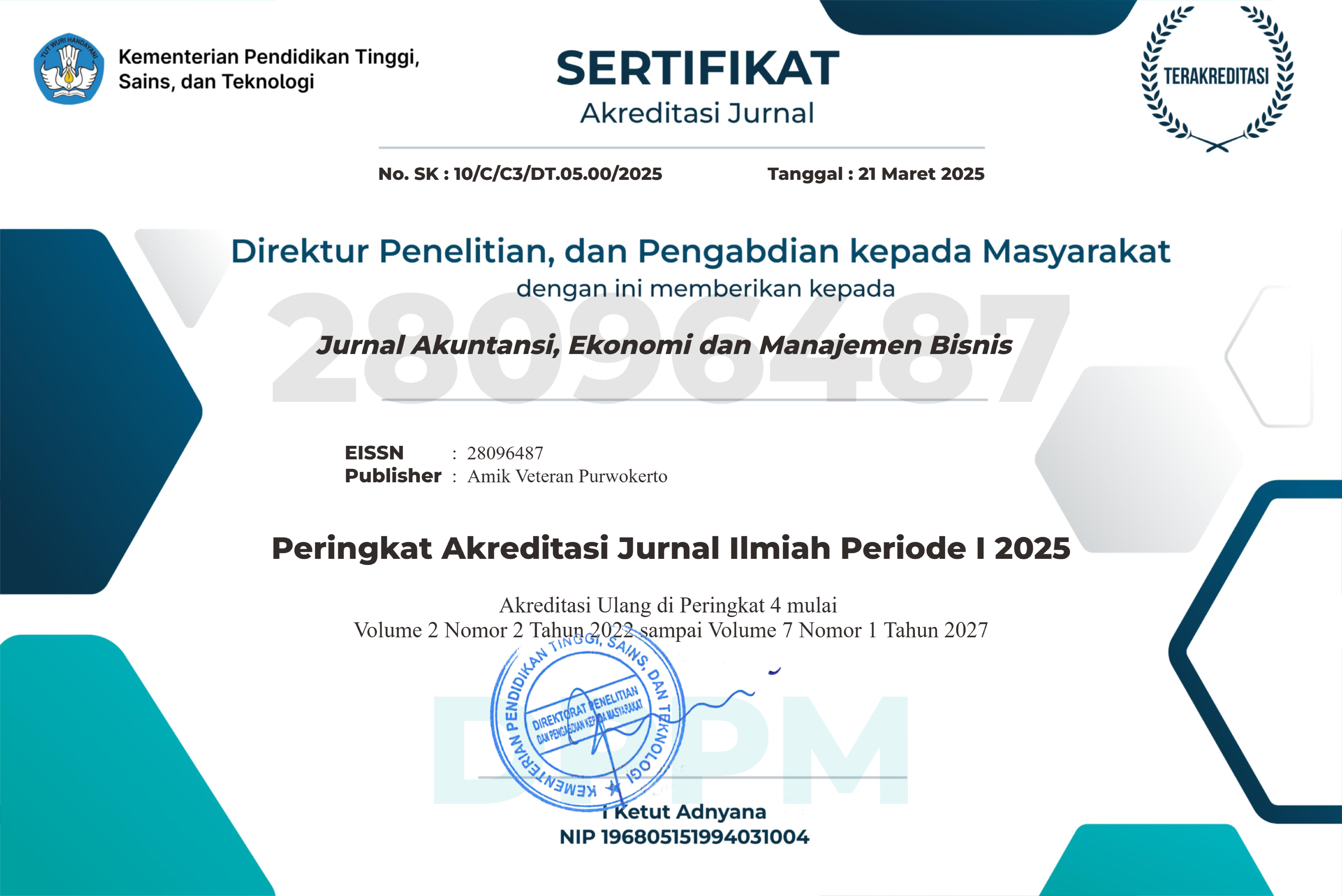Pengaruh Artificial Intelligence dalam Pembelajaran terhadap Self Management dengan Self Efficacy sebagai Variabel Mediasi pada Mahasiswa Fakultas Ekonomi dan Bisnis Universitas Negeri Padang
DOI:
https://doi.org/10.55606/jaemb.v5i1.7940Keywords:
Artificial Intelligence in Learning, Self-Management, Self-EfficacyAbstract
This study aims to examine the influence of artificial intelligence in learning on students' self-management, with self-efficacy as a mediating variable. The background of this research lies in the low ability of students to manage themselves effectively, which impacts delays in completing their studies. This is a causal research study. The population and sample consisted of students from the Faculty of Economics and Business at Universitas Negeri Padang. A total of 100 students were selected using cluster random sampling. Data were collected using a questionnaire with a Likert Scale. The analysis method employed was SEM-PLS using SmartPLS version 4.1.1 software. The results of the data analysis indicate that: (1) artificial intelligence in learning has a positive and significant effect on the self-management of FEB UNP students; (2) artificial intelligence in learning has a positive and significant effect on the self-efficacy of FEB UNP students; (3) self-efficacy has a positive and significant effect on the self-management of FEB UNP students; and (4) self-efficacy mediates the effect of artificial intelligence on the self-management of FEB UNP students.
References
[1] M. Ossama, Self Management. Scriptor Publication, 2022.
[2] M. Barida and H. Prasetiawan, “Urgensi Pengembangan Model Konseling Kelompok Teknik Self Management Untuk Meningkatkan Kecerdasan Moral Siswa SMP,” Jurnal Fokus Konseling, vol. 4, no. 1, p. 27, 2018.
[3] D. Muhammad, “Perkembangan Dan Transformasi Teknologi Digital,” Infokam, vol. 15, no. 2, pp. 116–123, 2019.
[4] H. Crompton and D. Burke, “Artificial Intelligence In Higher Education: The State Of The Field,” International Journal Of Educational Technology In Higher Education, vol. 20, no. 1, 2023.
[5] F. Kamalov, D. Santandreu Calonge, and I. Gurrib, “New Era Of Artificial Intelligence In Education: Towards A Sustainable Multifaceted Revolution,” Sustainability (Switzerland), vol. 15, no. 16, pp. 1–27, 2023.
[6] B. Mukti and F. Tentama, “Faktor-Faktor Yang Mempengaruhi Efikasi Diri Akademik,” 2019.
[7] A. Ahmad and T. Safaria, “Effects Of Self-Efficacy On Students’ Academic Performance,” Journal Of Educational, Health And Community Psychology, vol. 2, no. 1, pp. 22–29, 2013.
[8] P. A. Heslin and U. C. Klehe, “Self-Efficacy,” in Encyclopedia Of Industrial/Organizational Psychology, 2006, vol. 2, pp. 705–708.
[9] A. Y. Salam, “Efek Self Efficacy Training Terhadap Self Efficacy Dan Kepatuhan Diet Diabetesi,” Tesis, Universitas Diponegoro, 2017.
[10] R. E. Boyatzis, D. Goleman, and K. Rhee, “Clustering Competence In Emotional Intelegence: Insights From The Emotional Sompetencie Inventory,” in Handbook Of Emotional Intelligence, 2000, pp. 343–362.
[11] S. Maes and P. Karoly, “Self-Regulation Assessment And Intervention In Physical Health And Illness: A Review,” Applied Psychology, vol. 54, no. 2, pp. 267–299, 2005.
[12] M. H. Al-Abyadh, H. Abdel, and H. Abdel, “Academic Achievement : Influences Of University Students ’ Self-Management And Perceived Self-Efficacy,” 2022.
[13] A. Bandura, Self-Efficacy: The Exercise Of Control. Macmillan, 1997.
[14] C. Bratianu, I. N. Iliescu, and D. Paiuc, “Self-Management And Cultural Intelligence As The New Competencies For Knowmads,” in ECMLG 2021 17th European Conference On Management, Leadership And Governance, 2021, p. 90.
[15] H. Seli, Motivation And Learning Strategies For College Success: A Focus On Self-Regulated Learning, 7th ed. Routledge, 2023.
[16] M. M. S. Ghaleb and A. A. Alshiha, “Empowering Self-Management: Unveiling The Impact Of Artificial Intelligence In Learning On Student Self-Efficacy And Self-Monitoring,” Eurasian Journal Of Educational Research, vol. 2023, no. 107, pp. 68–94, 2023.
[17] F. S. Lodjo, “Pengaruh Pelatihan, Pemberdayaan Dan Efikasi Diri Terhadap Kepuasan Kerja,” Jurnal Riset Ekonomi, Manajemen, Bisnis Dan Akuntansi, vol. 1, no. 3, pp. 747–755, 2013.
[18] A. Bandura and S. Wessels, “Self-Efficacy,” 1994.
[19] M. Hajari, “Machine Learning In Artificial Intelligence: Towards A Common Understanding,” 2021.
[20] L. Chen, P. Chen, and Z. Lin, “Artificial Intelligence In Education: A Review,” IEEE Access, vol. 8, pp. 75264–75278, 2020.
[21] F. M. Pangkey, L. M. Furkan, and L. A. Herman, “Pengaruh Artificial Intelligence Dan Digital Marketing Terhadap Minat Beli Konsumen,” Jurnal Magister Manajemen Unram, vol. 8, no. 3, pp. 21–25, 2019.
[22] Sugiyono, Metode Penelitian Kuantitatif, Kualitatif Dan R&D, 2nd ed. Alfabeta, 2022.
[23] Y. Chen, S. Yang, S. Zhang, and J. Yao, “Does Self-Management Of Learning Matter? Exploring Mobile Learning Continuance From A Valence Framework Perspective,” International Journal Of Mobile Communications, vol. 22, no. 4, pp. 429–448, 2023.
Downloads
Published
How to Cite
Issue
Section
License
Copyright (c) 2025 Jurnal Akuntansi, Ekonomi dan Manajemen Bisnis

This work is licensed under a Creative Commons Attribution-ShareAlike 4.0 International License.








